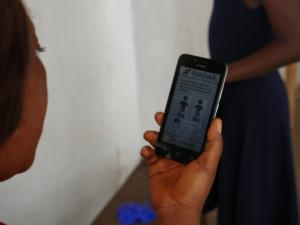Using SMS technologies to enhance polio surveillance
A new SMS-based reporting system has been introduced in Sierra Leone to improve identification, detection and reporting of suspected acute flaccid paralysis (AFP) cases in children less than 15 years, with the initial training of 520 health workers and community informants.
AFP surveillance is part of the global polio eradication strategy which requires health workers to promptly report and investigate any sudden onset of paralysis in the limbs of children or adults in order to confirm or rule out the circulation of wild polio virus, and is essential for polio-free certification.
The SMS reporting system known as Auto-Visual AFP Detection and Reporting (AVADAR) aims to facilitate:
- Instant notification of an AFP case with a minimum set of information collected at the community level
- Weekly reporting by health workers and community informants to a central server, on the presence or absence of AFP cases in their respective communities.
The training participants will form an effective surveillance network for the reporting of any acute or sudden onset of weakness or floppiness of one or more limbs in a child under 15 years of age, or any person of any age with paralytic illness in whom a clinician suspects polio.
Training beneficiaries have to date included national and district level official from the Ministry of Health and Sanitation, WHO surveillance staff and CDC-STOP teams, community health workers and community informants. This latter group includes traditional and spiritual healers, influential youths and traditional leaders, among others.
At the end of the training the informants were given GPS-enabled phones and solar chargers to carry out active case searches using their phones to report cases seen in their communities for further investigation. District and national health authorities will the automatically receive notification alerts in their AVADAR phone from all the informants, whenever a suspected AFP cases is detected and reported.
The AVADAR project will be implemented by the Ministry of Health and Sanitation in four pilot districts including Western Area Urban, Western Area Rural, Kono and Tonkolili with the support of a consortium of development partners including WHO, Novel-T, eHealth Africa; UNICEF, CDC, Bill and Melinda Gates Foundation, among others.



